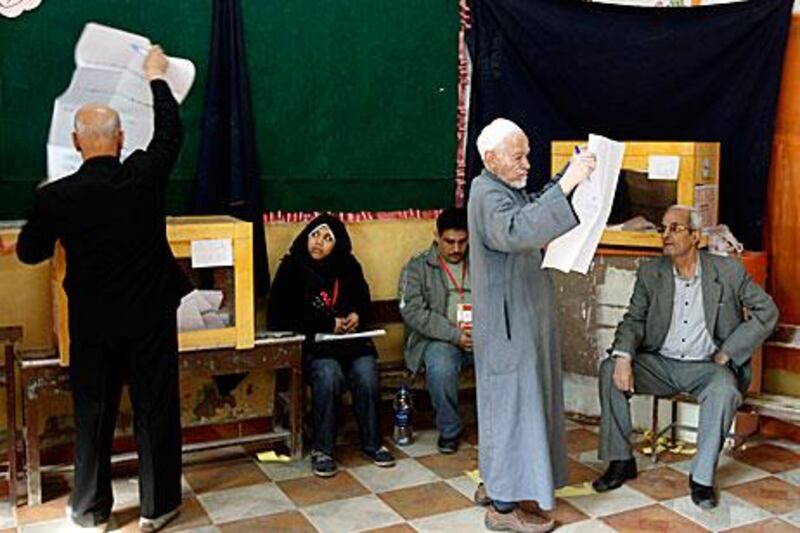CAIRO // The sense yesterday was that Egypt, for the first time, was holding credible elections.
In orderly lines, citizens waited patiently to cast their vote in the first poll since demonstrations and clashes with security forces led Hosni Mubarak, the president for nearly three decades, to step down in February.
"I came because it's time for a better Egypt," said Al Shaimaa Mohammed Seifiddin, 34, a music teacher waiting outside a polling station in Sayeda Zeinab. "It's important that a person feels they have a voice ... I feel like an Egyptian, a human in a democracy."
The elections for the 498-seat People's Assembly, parliament's lower chamber, came after violence flared last week in Tahrir Square as protesters demanded the military caretaker government cede power to civilian rule. At least 43 people died and 2,000 were injured.
"So far, it is the best election that Egypt has witnessed in the last 60 years," said Saad Eddin Ibrahim, the Egyptian-American sociologist leading a group of 9,000 election observers across the country under the guidance of the Ibn Khaldun Centre for Studies and Research. "There is a very impressive turnout and equally impressive is how people are behaving in a very civil way."
There were several incidents of ballot papers being unstamped and parliamentary candidate names missing, but Mr Ibrahim said that the Higher Electoral Commission was quick to right any errors. Each voting station was overseen by a judge, some of whom ordered hours of voting at their stations to be extended in cases where voting had a delayed start or where errors were found.
After standing in long queues in Cairo, Alexandria and a handful of rural governorates, Egyptians placed votes for political parties and individual candidates in the first of three rounds of elections that will see the whole country vote by mid-January. The same process will begin for the upper house, or Shura Council, in January.
Results for the People's Assembly will be announced by January 13, but individual candidate winners, comprising one third of the seats, will be announced as results are tallied in the weeks to come.
Last year's parliamentary elections were riven with accusations of deliberate miscounting and intimidation.
"Before the revolution, if I didn't come to vote, my name would still appear on the votes for the National Democratic Party," said Esmat Mansour, a manager at the InterContinental Hotel in Abu Dhabi who returned to Cairo to vote.
The NDP, now banned, was the political party of Mr Mubarak.
“Now, I know my vote is being counted correctly,” Mr Mansour said.
The streets of the country were festooned with campaign banners and political organisers rushed to hand out pamphlets urging voters to choose their candidates and parties.
By far, the most organised party in yesterday’s elections was the Freedom and Justice Party, which is controlled by the Muslim Brotherhood and forecast to win at least 40 per cent of the seats.
Representatives from the party, wearing yellow vests with the party’s logo, set up laptop kiosks at voting stations across the country to help citizens figure out at which station they were to vote.
While voters who were asked yesterday said the Freedom and Justice Party had broad support, many also said they were choosing candidates based on their organisation and commitment to improving the country.
“We want the revolution to achieve its goals,” said Hani Fawzi, 49, a scriptwriter waiting outside the voting station in the Shubra Masry neighbourhood.
“If we didn’t come, a large number of seats would go to people who do not want to achieve these demands.”
Some also saw the chance to vote for the potential implementation of a stricter interpretation of Islamic law.
Outside the Sayeda Zeinab mosque in central Cairo, Mahmoud Farouk, 65, said he had voted for candidates from the Salafist Al Noor Party to ensure Egypt would be governed according to Sharia law.
Salafism is an ultraconservative strain of Islam that is practised in Saudi Arabia and has a growing following in some other Muslim countries.
“It doesn’t mean we will be Iran,” Mr Farouk said. “But we must apply Allah’s law.”
The first day of elections came as protesters continued to occupy Tahrir Square in a bid to pressure the Supreme Council of the Armed Forces (Scaf) to hand control of the country to a civilian leadership.
The generals in charge of Scaf conceded in the days before the election to appointing a new prime minister and holding presidential elections next June, but many saw this as half-hearted and were pushing for more changes.
Several protesters said they would boycott the parliament elections because they were “illegitimate”.
Hisham Kassem, a former publisher of Egypt’s largest, independent newspaper, Al Masry Al Youm, said that some Egyptians had rejected the attempts by Tahrir Square protesters to influence the country without a popular mandate.
“This is the end of Tahrir today,” he said. “The [protesters] that are trying to hijack political will … now they are a minority.”
While Egyptians were “novices” at transparent and credible elections, Mr Kassem said the important thing yesterday was the turnout.
“This is a vote of confidence,” Mr Kassem said.
bhope@thenational.ae
* With additional reporting by Farah Halime and Zaineb Al Hassani in Cairo and Erin Cunningham in Alexandria





